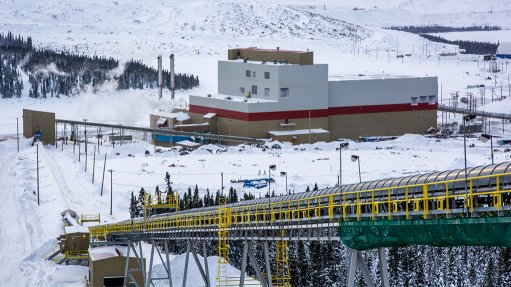Conscious effort needed to turn mining industry around – Motlanthe

Deputy President Kgalema Motlanthe discusses the state of the South African mining industry. Camerawork: Nicholas Boyd. Editing: Shane Williams. Recorded: 27/08/2013.
JOHANNESBURG (miningweekly.com) – Conscious effort is needed to turn the mining industry around through making structural changes to the economy and becoming more innovative in the quest for improved production levels, Deputy President Kgalema Motlanthe said on Tuesday, adding that mining remained central to South Africa’s economy.
Motlanthe delivered the keynote welcome address at the second yearly Mining Lekgotla, held in Sandton, stating that there were many critical mining industry issues that merited conscientious engagement at the event, with the most important aspect of the Lekgotla being its focus on collaborative partnerships.
“The South African mining sector faces problems arising from a convergence of the cumulative effects of past policies and practices and a global economic environment characterised by declining demand for commodities such as platinum and gold,” he said.
He added that the mining industry had, over the years, supported by discriminatory legislation, developed methods of making super-profits by relying on the exploitation of unskilled workers and that, despite the advent of democracy and the repealing of these laws, the industry had continued to rely on archaic practices that had not kept up with modern methods.
“As a result, the collective bargaining methods and institutions that we have developed over 18 years of democracy have been somewhat compromised by these archaic practices,” Motlanthe said.
He stated that one such practice that required immediate attention was the migrant labour system, which continued “to be a scar on the face of democratic South Africa”.
He said there had been no overhaul and investment in the migrant labour system, and there had been no attempt to find new ways to effect a more humane system of migrancy akin to the best migrant labour systems of the world.
“There has been no effort to create a system that rebuilds the migrant miners’ family through short work cycles; that would ensure a reinstatement of maximum remittances home to increase cash flow to the rural poor; that would significantly reduce the propensity for HIV infections; that would enhance attendance and reduce absenteeism and drive up both productivity and ensure that mining becomes a more attractive industry to work in and invest in,” Motlanthe said.
“Sadly, the mining industry has remained a prisoner of its apartheid past in this core element of cheap labour sourced through a migrant’s punishing annual work cycle and all the social evils associated with that cycle, and no amount of employment equity plans and empowerment transactions have ventured to tamper with this.”
The democratic conditions in which the industry was operating required that the labour force be reskilled and rewarded for their contribution, he said.
In light of these changing realities, the industry had to transform itself by focusing on ideas to improve productivity through innovation, human resource development and training.
“To move forward, the industry must break with its undesirable past by making workers feel valued for their contribution as wholesome human beings, who have decent jobs and sustainable livelihoods, including proper housing, recreation and time with families,” Motlanthe said.
Meanwhile, the Deputy President warned delegates not to let issues of improving and sustaining productivity fall through the cracks, as production still remained the core business of mining.
“Therefore, I am looking forward to deliberations and suggestions on how to improve and sustain productivity in a democratic South Africa where workers enjoy labour rights,” he said.
However, government equally expected workers to understand that a contribution was required from their side and that with labour rights came responsibilities.
“The industry and its workers have a collective responsibility to work together in tackling existing challenges.”
Motlanthe acknowledged that it was government’s primary responsibility to create an enabling environment, adding that government had no intention to micromanage mining companies.
“Save for the ever-present room for improvement, our legislative framework is sufficient for regulating the environment within which the industry operates.”
However, all role-players in the mining sector had to engage meaningfully to build the relationships based on trust that were necessary to bring stability to the sector and advance the South African economy.
“Each partner brings unique insights, understandings and inputs to the table, which augurs well for finding practical and sustainable solutions to the challenges the sector experiences. Therefore, all must dedicate the necessary capacity and time to ensure that we succeed in stabilising this important sector of our economy,” Motlanthe said.
Comments
Press Office
Announcements
What's On
Subscribe to improve your user experience...
Option 1 (equivalent of R125 a month):
Receive a weekly copy of Creamer Media's Engineering News & Mining Weekly magazine
(print copy for those in South Africa and e-magazine for those outside of South Africa)
Receive daily email newsletters
Access to full search results
Access archive of magazine back copies
Access to Projects in Progress
Access to ONE Research Report of your choice in PDF format
Option 2 (equivalent of R375 a month):
All benefits from Option 1
PLUS
Access to Creamer Media's Research Channel Africa for ALL Research Reports, in PDF format, on various industrial and mining sectors
including Electricity; Water; Energy Transition; Hydrogen; Roads, Rail and Ports; Coal; Gold; Platinum; Battery Metals; etc.
Already a subscriber?
Forgotten your password?
Receive weekly copy of Creamer Media's Engineering News & Mining Weekly magazine (print copy for those in South Africa and e-magazine for those outside of South Africa)
➕
Recieve daily email newsletters
➕
Access to full search results
➕
Access archive of magazine back copies
➕
Access to Projects in Progress
➕
Access to ONE Research Report of your choice in PDF format
RESEARCH CHANNEL AFRICA
R4500 (equivalent of R375 a month)
SUBSCRIBEAll benefits from Option 1
➕
Access to Creamer Media's Research Channel Africa for ALL Research Reports on various industrial and mining sectors, in PDF format, including on:
Electricity
➕
Water
➕
Energy Transition
➕
Hydrogen
➕
Roads, Rail and Ports
➕
Coal
➕
Gold
➕
Platinum
➕
Battery Metals
➕
etc.
Receive all benefits from Option 1 or Option 2 delivered to numerous people at your company
➕
Multiple User names and Passwords for simultaneous log-ins
➕
Intranet integration access to all in your organisation



















